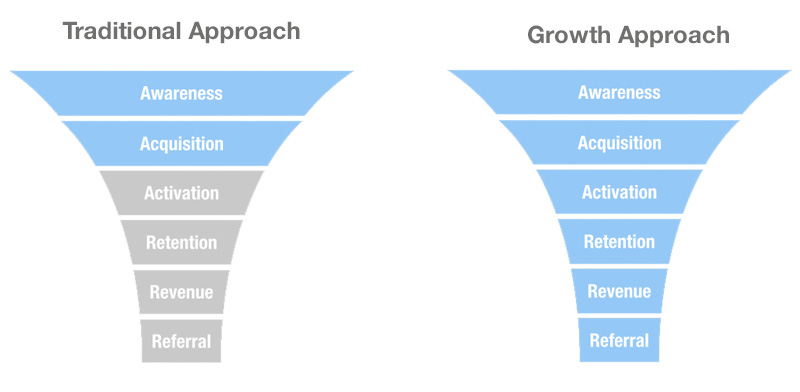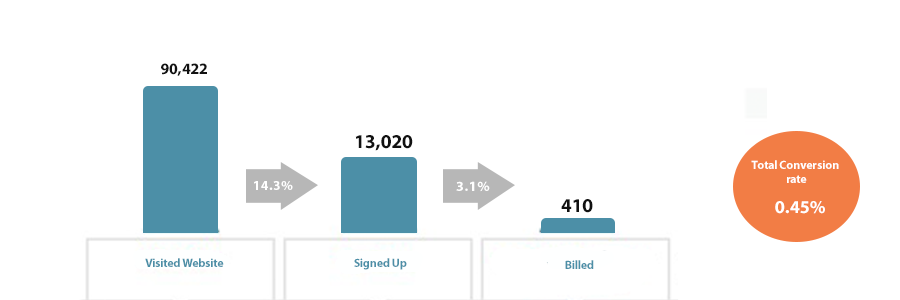
Recently, I was quoted alongside the likes of Brian Balfour and Dharmesh Shah from HubSpot in a Business Insider article on Growth Hackers. The article explored what Growth Hackers do and why they have come into so much demand recently and is worth a read.
In the wake of this article though, I wanted to pen (read: type) my own thoughts on ‘Growth Hackers’ and how they can help SaaS companies grow (as SaaS growth is really the focus of this blog).
Although I understand the reasons why Sean coined the term, I must admit I don’t really like the term ‘Growth Hacker’. I think that the inclusion of the term ‘Hacker’ gives a perception that their job is to find some sort of magical API connection or some other crazy technical hack that is going to drive growth for a company.
But that’s not the case and rarely does a software company achieve massive growth through a one-off tactic. Instead, they achieve it by truly understanding the core value the product provides (The ‘must-have’ experience as it’s known) and then experimenting with many different ways to get as many potential customers to experience that value as possible.
So in this post, I wanted to outline in very simple terms the difference between Growth Hackers and Marketers and make the case for why your software company may actually need both.
What is a Growth Hacker?
A Growth Hacker is someone who focuses not on traditional marketing measurements like number of website visitors or brand awareness, but on actual growth of a product (monthly active users, monthly recurring revenue, etc).
The main differences between the role of a Growth Hacker and a traditional marketer are as follows:
A direct focus on growth
If you look at the average customer acquisition and retention funnel for a SaaS product (shown in the diagram above), a traditional marketing person usually focuses on the top 2 tiers of the funnel: driving awareness and acquiring customers. They are usually focused on things like SEO, Content, Paid Advertising, etc and their key metrics are usually associated with brand awareness, website visitors, signups & leads.

A Growth Hacker on the contrary realises that holistic business growth can often be achieved by looking further down the funnel, through things like increasing activation, reducing churn or increasing referral. A Growth Hacker is is often more focused on metrics that tell a broader picture of the businesses growth, such as Monthly Active Users, Monthly Recurring revenue, etc.
A broader scope of work
Traditional marketing is generally limited in scope to things like advertising, collateral, websites, etc which are all made to market the product, but are not part of the product itself.
Growth Hackers on the contrary aren’t limited in scope and often focus on how to best utilise product features and design to achieve growth. The best growth hacks are often things to do with the product itself, like Dropbox’s referral program or AirBnBs professional photography program.
What does a Growth Hacker actually do?
A good Growth Hacker will look at usage data from the product and devise and execute experiments that are aimed at moving the needle on the key metrics of business growth.
Still confused? Let’s go with an example.
Imagine your software company has a ‘touchless’ acquisition model where potential customers become paying customers by coming to your website, signing up for your product (usually for a free trial or on a free plan) and then upgrading to a paying plan, without ever talking to a sales rep.
Your funnel might look a bit like this:

Through your marketing efforts you are managing to get 90,422 people to visit your website, of which 13,020 people go on to signup and 410 of them go on to becoming paying customers.
A traditional marketer would look at the website visitors and signups and be happy they are driving 90,000+ visitors each month and getting 13,020 signups at a 14.3% conversion rate. If you asked them how to grow the business, they would tell you they need more budget to invest in more ads & more content to scale up the visitor and signup rates.
A Growth Hacker on the contrary would look at the full funnel and realise that the biggest opportunity for growth is not getting more website visitors and signups, but increasing the rate at which the people who signup go on to become paying customers.
If you asked them how to grow the business, rather than spending more money on scaling acquisition efforts a Growth Hacker would devise and implement experiments (which could be anything from changes in the design of the product to implementing triggered emails based on in-app actions a user makes) to move the needle on the Signup – Billed conversion rate. They would be constantly measuring the improvement their experiments are making and would then iterate on the learnings from each experiment to devise and deploy more experiments to get the desired result.
It’s worth mentioning that this is just a simplified example from the ‘acquisition’ end of the funnel. Growth Hackers also understand the importance of the Retention and Referral parts of the funnel in achieving growth and are able to devise and implement experiments that leverage the bottom end of the funnel to grow the business as well.
Does my software company actually need a Growth Hacker?
In short, if you are a SaaS company you would likely benefit from having a Growth Hacker as part of your team. But that doesn’t necessarily mean you need to fire your marketing team just yet.
The fastest growing software companies often have a mix of both. I know the likes of HubSpot and KISSmetrics have both Growth Hackers and more traditional marketers in their teams because they realise that things like branding & positioning, SEO, content & lead generation are also just as important in creating the Growth Engine a software company needs.
Those who have the resources often have dedicated marketing teams who handle things like content, social, events, SEO, SEM, etc and then have growth teams who work across both product, sales and marketing to ensure all of the different ways of achieving growth are being utilised, not just the traditional marketing ones
For those with fewer resources, often the best way to achieve growth is to hire a head of marketing who understands both traditional marketing and Growth Hacking and can build a team of people with skills in engineering, data, content, SEO & more that is able to leverage both approaches to create a sustainable, scalable Growth Engine.
Regardless of which way you go, you need to ensure you give these teams the support and the authority to do what they need to do to drive Growth. I cannot stress this point enough. Just employing someone who understands the Growth Hacking approach isn’t sufficient, you need to make sure that they have the authority to make the changes and run the experiments they need to run… Otherwise all you’ll end up with is a very talented team member who can help you achieve growth but who’s hands are tied by departmental silos & un-necessary processes & politics.


No Comments